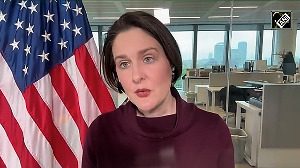The Avengers star walks out of an interview.
Abhishek Mande Bhot knows the feeling.

I watched with discomfort the Robert Downey Jr interview from which The Avengers star walked out after being asked about his past.
It brought back some very bitter memories of my interview with Bollywood director Amole Gupte who, like Downey Jr, walked out mid-way, leaving me red-faced.
The site I worked for then didn't post my video on YouTube. So, after it shut down, the video disappeared too.
That moment has stayed with me: Gupte stormed out of the frame, calling me unworthy of being a journalist as he walked past his wife, Deepa Bhatia.
Ms Bhatia, who had edited Taare Zameen Par, looked on with disbelief.
Just minutes before this scene unfolded, we had wrapped up a very good interview ourselves. She had congratulated me on asking sensible questions so when her husband walked out, she too was taken aback.
Several years have passed since that day and I have learnt much since, but each time I go before the camera with a celebrity, I remember that interview.
So you can imagine why Robert Downey Jr's walking out like that hit a raw nerve.
Let's see what happened with the Hollywood star.
It begins (external link) like any other boring movie promotion interview. He speaks about his character, the movie and even goes on to explain the concept of Ultron.
All that changes when the interviewer, Krishnan Guru-Murthy of Channel 4 asks him about his prison time even as he lets Downey Jr know it was okay if he wanted to pass the question.
Downey Jr gets shifty, but goes on to give a half-hearted response.
Guru-Murthy proceeds to ask him if he was still okay to take a few personal questions, to which Downey Jr replies: 'You have as much time as anyone else will.'
Downey Jr is again reminded that he does not have to answer any questions he doesn't wish to but it is all downhill from this point on.
Guru-Murthy, a journalist with some 27 years of experience, senses this as does Downey Jr who points out: 'Your foot's starting to jump a little bit; you better get to your next question.'
Downey Jr is evidently upset; his breathing becomes heavy and he is looking straight at Guru-Murthy, his eyes revealing the anger that's building up inside him. He's been challenged and he doesn't like it.
Guru-Murthy asks him if he was free of drugs and alcohol addiction.
That is pretty much the end of the interview.
Guru-Murthy isn't new to this kind of stuff.
While promoting Django Unchained, director Quentin Tarantino told him that he was 'shutting your bu** down' (external link) when he was asked about the link between violence in cinema and real life.
Mind you, this was in the light of the Sandy Hook school killings and Joe Biden, the US vice-president was at the time talking to people in the movie and the gaming industries about reducing violence on the screen.
Irrespective of which side of the debate about the connection between violence in films and real life you were on, you have to admit that Guru-Murthy's question was not out of context.
Tarantino's response: 'This is a commercial for (my) movie. Make no mistake.'
Entertainment journalists and celebrities have always shared a mutually convenient but distrustful relationship. They use us to promote their movies; we use them to sell copies of our newspapers and magazines or increase the page views of our Web sites.
Mind you, neither of us believes the other to be a friend.
So, every once in a while, we have flare-ups like these.
I am not in any way suggesting that the celebrity is at fault all the time.
Cate Blanchett ended a promotional interview for her recent movie, Cinderella when she was asked about, wait for it, the cat in the film.
Blanchett is one of the many high profile female celebrities in Hollywood who has joined the 'Ask her more' campaign that hopes to get movie correspondents to ask female celebs more than just who they are wearing.
The journalist, in this case, evidently hadn't got the memo (external link).
Closer home, Alia Bhatt shot back at journalists, twice: Once when she was asked about her relationship with Siddharth Malhotra and the second time when she was asked, somewhat cheekily (and foolishly), if she knew what Holi was.
Parineeti Chopra also gave it back to a reporter when he asked her a ridiculously sexist question (external link).
Mallika Sherawat called out a journalist who made the mistake of telling her that she was giving India a bad name overseas by calling it regressive (external link).
I have witnessed several press conferences during which I see movie stars trying hard to be patient with us.
On the other hand (and on several more occasions) I have seen journalists (me included) being made to wait for hours for a three-minute sound byte or some 'group interview' in which the star will refuse to answer beyond a set of certain questions.
What is more humiliating is that the star will then go on to complain that s/he gets asked the same questions over and over again. And I want to tell them: But you don't want to answer new questions!
Today, it is impossible to get any of the top five movie stars in Bollywood for an honest one-on-one interview, which spans beyond seven minutes unless your media house has a marketing tie-up with the movie they are part of. Even then, they will rarely ever want to go outside their comfort zone and open up.
Robert Downey Jr, as I have now discovered, is no exception.
He tried to put on a brave, if somewhat arrogant, face.
And then, like many celebrities I have known, he walked out because he didn't like the question.
In my opinion, there is nothing noble or professional about that.










 © 2025
© 2025